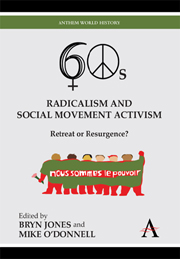Introduction Sixties Radicalism: Creating Spaces and Leaving Legacies
Published online by Cambridge University Press: 05 March 2012
Summary
I'm talking to the 60s group … that survived the war, the drugs the politics the violence on the streets, the whole shebang. We've survived it and we're here.
(John Lennon, 1980. 12 hours before his murder outside his New York home)Introduction
The title of this collection may prompt two types of reaction. For some, it is inappropriate to talk about the resurgence of phenomena that have become established and ‘mainstream’. Personal freedoms in sexual relations, artistic expression and ongoing campaigns for equal rights have all become institutionalised in the past 40 years. However for other readers, familiar with the extravagant mission of the counter-culture and the shrivelling of revolutionary – or pseudo-revolutionary – politicking, the ‘spirit of the 60s’ may be thought of as beyond resuscitation. As one seasoned political journalist recently opined: ‘1968 was not a beginning – it was humanity's last rage against the dying of the light, the last, great street festival before darkness closed in.’ (Wilby 2008) Or, as a music expert wrote of the cultural upsurge of the period, it is ‘our former way of life, far away from us on the other side of the sun-flooded chasm of the Sixties’ (MacDonald 1995, 34).
The contributions in this book however demonstrate that continuity and ‘resurgence’, exceeding the liberalisation of personal freedoms, exist in two key respects: as spaces and as active legacies. Resurgence is possible because the radical movements of the sixties opened up a series of previously non-existent, or only embryonic, social spaces (Touraine 2004, 225).
- Type
- Chapter
- Information
- Sixties Radicalism and Social Movement ActivismRetreat or Resurgence?, pp. vii - xxPublisher: Anthem PressPrint publication year: 2010
- 1
- Cited by



